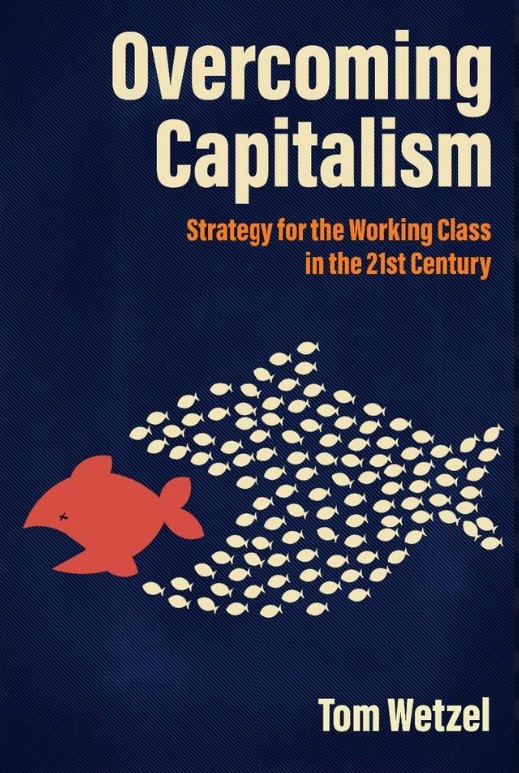Category: Syndicalism
by Tom WetzelReposted from Workers Solidarity The downward slide of the major (Class 1) American freight railroads in recent years shows how capitalist ownership of the railway system is dangerous and inefficient — and fails to make use of the potential of the railways as a solution to the global warming crisis. Downward slide has been accelerated over the past decade due to the adoption of “Precision Scheduled Railroading” (PSR). This has no precise definition but the aim is to reduce costs. As in “lean production” management theory, any expense not directly needed for profit is regarded as “waste.” PSR is a cost-cutting strategy that puts short-term profits for stockholders as the controlling priority. To maximize the rate of return, the railroads cut corners on maintenance, constantly work to reduce the number of railroad employees, and actively discourage shipments that are less profitable for them to haul. To keep Wall Street investors happy, they work to maximize short term profit. To enrich stockholders, the rail companies have poured billions of dollars into stock buybacks rather than invest in system improvements. Poor Service The federal “common carrier obligation” says railroads are required to provide carload freight service “at reasonable request” —…
From Workers Solidarity By Tom Wetzel I’m going to suggest here that the working class has a unique role to play in the fight against global warming because the owning and managing classes have interests that are tied to an economic system that has an inherent tendency towards ecological devastation whereas the working class does not. In its “Code Red for Humanity” warning in 2021, the UN’s Intergovernmental Panel on Climate Change said: “The alarm bells are deafening, and the evidence is irrefutable: greenhouse‑gas emissions from fossil-fuel burning and deforestation are choking our planet and putting billions of people at immediate risk. Global heating is affecting every region on Earth…” With wreckage from intensifying storms and people dying from heat waves, it might seem that everyone has a stake in the project of ecological sustainability, and bringing a rapid end to the burning of fossil fuels. As we know, however, various sectors of the owning and managing classes pursue profits from fossil fuel extraction, refining, and burning fossil fuels. They protect sunk investments in fossil fuel-based infrastructure (like gas burning power plants) or propose highly implausible strategies (like carbon capture and storage). Thus many sectors of the top classes in…
What is Class Consciousness? A Reply to John Holloway By Tom Wetzel A crucial concept for understanding the potential for getting rid of the capitalist mode of production and replacing with a labor-managed mode of production is the concept of class formation. The idea is that a working class that has actually developed the “class consciousness”, cohesion, solidarity, confidence, organizational strength, and aspirations for control over their lives to challenge the owning and managing classes for control of the society doesn’t come into existence “automatically” or “spontaneously” due to being an oppressed and exploited class, subordinate to boss power, forced to seek jobs from the employers who run their firms as managerial autocracies.Some left wing pundits confuse the working class situation with having a certain “identity”. But “identity” is a subjective concept, based on beliefs people have. The proletarian condition, on the other hand, is an objective situation. The working class don’t have our own means to a livelihood. If we are going to avoid dire situations like starvation, being kicked out of our apartment due to non-paymnt of rent, or being unable to buy needed medicines, we typically have to get a job, where we receive wages in exchange…
From ideas & action. By Tom Wetzel As the burning of fossil fuels continues to pump up the size of the carbon dioxide layer in the atmosphere, the global warming crisis becomes ever more acute. In its “Code Red for Humanity” warning in 2021, the UN’s Intergovernmental Panel on Climate Change said: “The alarm bells are deafening, and the evidence is irrefutable: greenhouse‑gas emissions from fossil-fuel burning and deforestation are choking our planet and putting billions of people at immediate risk. Global heating is affecting every region on Earth…” But we’re losing the climate battle thus far. In Climate Change as Class War, Marxist geographer Matthew Huber argues that the climate movement is losing because it is rooted in the “professional class.” He argues that this class lacks the power to defeat the powerful capitalist interests that drag their heals against the kind of drastic cutting back of fossil-fuel burning that is needed. For Huber, the climate movement needs to be rooted in the working class to have sufficient power to enact radical structural reforms needed to effectively fight global warming. Huber analyses the existing climate movement as consisting of three layers. First, there are the “science communicators” like James…
By Tom Wetzel This post is based on Chapter 10 in Overcoming Capitalism. A major contribution of Marx to the socialist movement was his analysis of the structure and dynamics of the capitalist regime or social formation. The influence of Marx’s social theory went beyond the self-avowed “Marxist” parties and intellectuals, and had an influence on the broader socialist movement which has always included a variety of different viewpoints and ideas about strategy and social change. Looking at the long arc of history, Marx distinguishes various “modes of production” that have existed since the emergence of states and systems of class oppression and exploitation. The idea here is a kind of hypothesis about how we understand the dynamics of social struggles and changes. A “mode of production” is a social structure that governs production — the way the society is structured to make a living, producing the things that are needed in a society at a given time. I follow G.D.H. Cole in interpreting Marx as a realist. In the realist approach to explanation of events and changes over time, two causal components are necessary. There is the course of events that provide the triggers for new events and changes….
By Tom Wetzel Back in the 1860s the first international association of unions was committed to the idea that working people could change the society, and get out from under the oppressive power of the owners and their institutions. They said “the emancipation of the working class must be the work of the workers themselves.” The working class is nowadays a majority of the population — a highly diverse population with groups subject to various conditions such as specific forms of discrimination for various sub-groups. How could the working class actually come together, build solidarity among the various sub-groups of the oppressed majority, and organize itself to oust the owning and managing classes from their power over us? This is where strategy comes into play. My main focus in this book is on the strategies and tactics that various people on the radical left in recent decades have proposed for shifting us away from capitalism — achieving liberation from this ecocidal and oppressive system.An inspiration for me in this effort was Bertrand Russell’s little book, Roads to Freedom, written in 1918. Russell had a chapter devoted to each of the main radical tendencies of that era in Britain — Marxism,…

